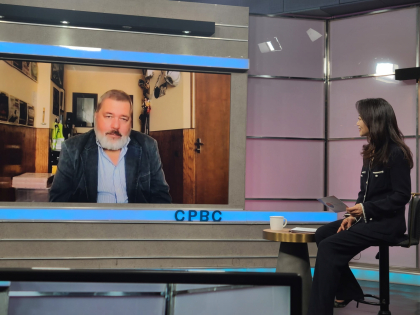During the SIGNIS World Congress 2022, held under the theme “Peace in the Digital World”, we explored the themes of global wars and the culture of friction, and hate in the digital world towards the tasks journalists must undertake to support peace.
At the International Journalists Forum, we had the honor of interviewing Mr. Dmitry Muratov – founder of the Russian newspaper Novaya Gazeta and 2021 Nobel Peace Prize – about the role of journalists in safeguarding peace.
Mr. Muratov spoke about the difficult situation he found himself in as shortly after he won the Nobel Prize, Russia invaded Ukraine and the Novaya Gazeta suspended publication due to increased government censorship. He proceeded to discuss the Ukrainian situation and the tendency of media to turn a blind eye to people’s suffering so they don’t emotionally exhaust their audience. But exercising empathy and telling the stories of those who suffer is a journalist’s responsibility, no matter how hard it is.
The Nobel Prize winner also expressed his opinion about freedom of the press in the digital world, affirming that with the emergence of thousands of sites and millions of new resources, centralized actions of censorship have become much more complex, and more and more people are exposed to the truth. However, he also stressed that digital mediums are making anonymity too easy, leaving press workers the chance to not take responsibility for the information they disseminate. Therefore, there is a great conflict between how to provide information and verify the facts, and how quickly to provide and verify it all.
Muratov shared the gravity of Russia’s situation in terms of freedom of speech and freedom of the press: “many Russian journalists are forced to leave the country; some have been declared foreign agencies and some even public enemies. The Russian government has successfully completed the destruction of press independence over the past 25 years: using force and oppression, television has beaten computers and propaganda has triumphed over media freedom”, affirms the journalist.
He then proceeded to talk about the role of propaganda in digital media and how it is still a weapon in war, as it’s all about turning someone into an enemy. At the same time, Muratov sees this moment as a turning point: “the internet nowadays allows us to respond to propaganda and to spread rightful information, which the old Internet couldn’t do”. He continues, “the best way to respond to propaganda is by using the standards of professionalism and reporting facts, resisting the wave of unsolicited and unverified information spreading on social media”.
To conclude his intervention, Dmitry Muratov reminded all the attendees that “without freedom of the press, society would have no power”. It is the duty of a journalist to exercise empathy while telling the truth. It is a journalist’s duty to fight propaganda and hate with facts”.


